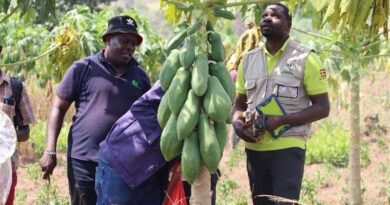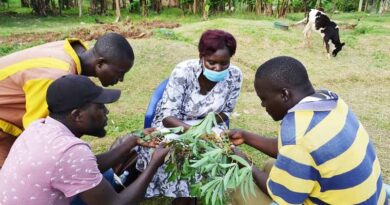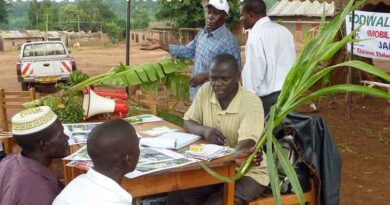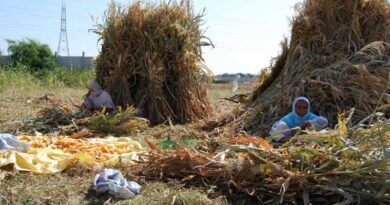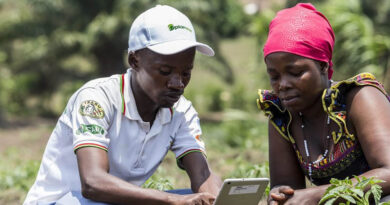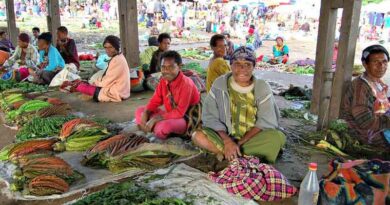CABI showcases potential of joint crop-livestock clinics and efforts to manage invasive papaya mealybug at NARO-MAK Scientific Conference in Uganda
20 March 2023, Uganda: CABI has showcased the potential of joint crop-livestock clinics to help strengthen agricultural extension services at the 3rd Joint National Agricultural Research Organisation and Makerere University (NARO-MAK) Scientific Conference.
The Prime Minister of Uganda, the Rt.Hon. Robinah Nabbanja, was among the distinguished guests who visited the CABI stand to learn more about the ‘One Health’ approach to extension during the event at Kampala’s Speke Resort Hotel, Munyonyo.
CABI team, including Dr Ivan Rwomushana, in collaboration with NARO and district partners also showcased poster work on findings of farmers’ knowledge and impact associated with management of the invasive papaya mealybug.
Previously, the Prime Minister – in her speech at the opening ceremony of the conference – pledged Government plans to increase extension services at the parish level as well as follow up support to implement Uganda’s National Fertilizer Policy. She also emphasized the government’s efforts to increase access to finance targeting farmers and value chain actors in the various existing institutions.
The conference, under the theme of ‘Innovations for Enhancing Productivity and Agro-Industrialization,’ aimed to spark evidence-based discussions on the practical issues in agriculture and to showcase advances in research and innovation that can contribute to development and transformation of the agricultural sector.
Sub-themes of the conference included embracing ICT-based innovations for agricultural transformation as well as cross-cutting topics such as COVID-19 and the role youth and gender plays in Africa’s agricultural industry.
A team of CABI experts including Christine Alokit, Communication and Extension Scientist, and Caroline Aliamo, gave a presentation on ‘The Potential of Joint Crop-Livestock Clinics in Strengthening Agricultural Extension Services in Uganda.’
The presentation included input from Patience Rwamigisa, Angella Namyenya, Dr Sol Danielsen and Idah Mugambi. It was assisted by Dr Patience Rwamigisa, Assistant Commissioner, Agricultural Extension Coordination at the Ministry of Agriculture, Animal Industry and Fisheries (MAAIF) and extension staff implementing project at the district local governments.
Delegates at the conference heard how CABI is leading the ‘Joint crop and livestock services for smallholder farmers’ project – funded by Biovision Foundation and WTS Welttierschutzstiftung – to develop integrated crop-livestock health advisory services in both Uganda and Kenya.
So far, over 1,600 smallholder farmers have been reached at six joint-crop livestock clinics in the districts of Mukono, Luwero, Buikwe, Kayunga, Kagadi and Hoima, in Uganda, where a ‘One Health’ approach to agricultural productivity is being adopted.
Aflatoxins, rabies and misuse of pesticides and drugs are among the top issues prioritised to be addressed at joint crop-livestock clinics set up to help improve the health and livelihoods of smallholder farming families in Uganda.
The clinics have received nearly 1,900 enquiries on both crop and livestock problems – of which 8.4% are related to ‘One Health’ issues, with the top problems being aflatoxins, rabies and misuse of pesticides and drugs.
While the main crops presented with issues at the clinics include bananas, coffee, cocoa, tomato, other cereals and fruits and vegetables, animals taken for advice on vectors, feeding and shelter include cattle, chickens, pigs and goats.
Rabbits, turkeys and pet cats and dogs have also been taken for advice on their welfare and vaccinations.
CABI’s work in plant health and plant clinics over the last 18 years – under the Global Plant Clinic and Plantwise programmes – revealed potential ‘One Health’ (OH) benefits of broadening the scope of plant clinics to better meet farmers’ need for advice.
Ms Alokit said, “The joint crop-livestock ‘One Health’ approach to extension is an opportunity to innovate by using existing resources in a new way that incorporates both a demand for advice on plant health but also animal husbandry that can be used to complement existing extension approaches.
“From our research so far, we have learnt that integrated crop-livestock services have the potential to improve service delivery with regards to cost efficiency, cross-sectional synergies and long-term impact.
“We can reach more farmers with existing resources – which is a cost saving for farmers, share knowledge and learning more easily and produce better health and welfare outcomes that ultimately lead to improved livelihoods and food security.”
The CABI team further highlighted at the conference that there is a need to explore joint crop-livestock clinics for recognition at agricultural policy and strategic levels as potential sources of knowledge, information and technology diffusion.
As part of the ‘Joint crop and livestock services for smallholder farmers’ project data is already being made available to facilitate planning and decision making at all levels for, among others; Government planning authorities; research and training institutions (academia), the private sector (farmers, investors, and traders), Non-Government Organizations (NGOs), and Development partners.
Dr Ambrose Agona, Director General of NARO, in his message in the conference programme, said, “NARO’s research agenda is aligned to contributing to the achievement of the national aspirations that are on the other hand aligned to the regional, continental and global (SDGs) aspirations.
“Key in her agenda is contributing to building resilient food system, Agro-industrial development and inclusive economic growth.”
Also Read: Tendovo soybean herbicide from Syngenta earns rave reviews during first season of use
(For Latest Agriculture News & Updates, follow Krishak Jagat on Google News)



